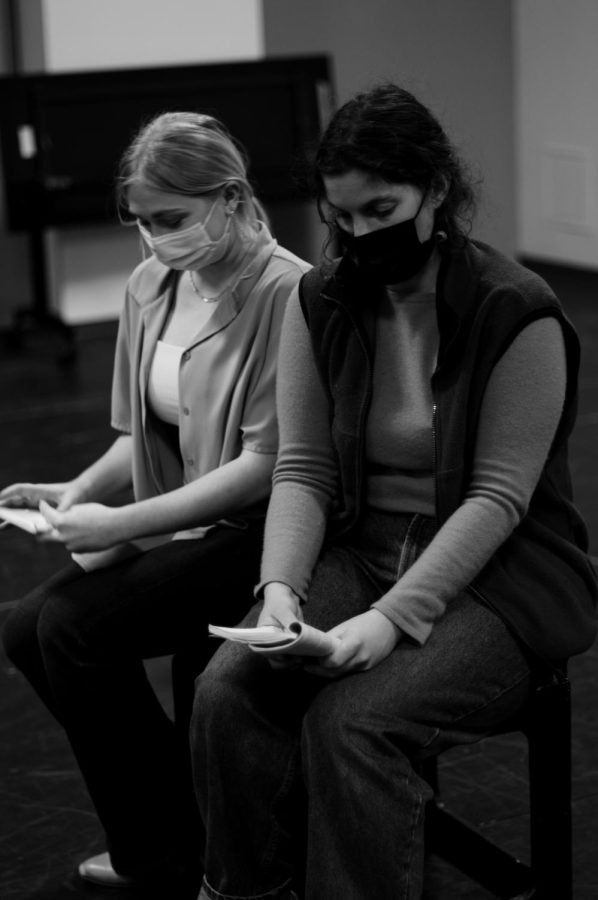Gothic Satire The Moors Brings English Countryside to Stage
Students rehearse for the premiere of The Moors, set to run in the Irene and Alan Wurtzel Theater May 5–8
The Moors, a play set in the 18th-century English countryside, will run in the Irene and Alan Wurtzel Theater May 5–8. Written by American playwright Jen Silverman and directed by Professor of Theater Matthew Wright, the show follows an impressionable governess as she begins working for two sisters in their isolated countryside manor. Grappling with mounting jealousy and its inevitable consequences, the play explodes as deeply held resentments come to a head.
According to Silverman, inspiration for the play came from the lives and works of the Brontë sisters, who lived on the English moors.
“I was reading Charlotte Brontë’s letters and was very taken with the isolation against which her life played out,” Silverman wrote in an email to the Review. “I was struck by the way in which the isolation made her perceive her family, her landscape, and the landscape of her internal life.”
To help visualize the setting, Wright showed the cast images of the English moors. Cast member and College fourth-year Katie Friedemann says this influenced her understanding of the lives of the characters.
“Everything’s so sharp and gray, and the wind is so powerful, and the trees grow sideways,” she said. “There’s something just so unnerving about it, but it’s a literal force of nature. There’s no way to change it, so for these people that are on these moors, you live with the chaos.”
The Moors also features original music composed by College fourth-year Juli Worth. Their composition work was influenced primarily by the dark setting and tone of the play, featuring mostly vocal pieces with some lute and percussion.
“The English moors, as they’re presented in this play, are just a kind of sweeping wasteland where connection is almost impossible, and the scale and size of things is easily warped,” they said. “I wanted to make something that was at once disorienting but also rhythmically compelling.”
Worth also plays the role of the mastiff who has a complex and intimate relationship with one of the hens on the moor.
“It sounds a lot sillier than it actually is,” they said. “I mean, it is quite silly, but I think there is a reason for it in the play that’s maybe a little hard to explain in a quick conversation. So that’s been a source of joyful embarrassment for me in conversations with my parents.”
Wright has been interested in Silverman’s work since Oberlin put on their play Collective Rage: A Play in Five Betties in 2020 — the last production run by the Theater department before COVID-19. Wright highlighted aspects of the play’s connection to works such as Jane Eyre. He was interested in The Moors because he wanted to put on a show that expressed a broad range of identities.
“The Moors is a biting satire but very loving takedown of Gothic romance,” he said. “It explores gender identity, sexuality, isolation, and the ways that our culture can be isolating for people because of their identities.”
For example, Friedemann, who plays Marjory/Mallory, a maid whose name changes depending on which room she’s in, explained how the name changes represent changes in her character’s portrayal.
“You very rarely see the real her; she’s always putting something on,” Friedemann said. “It’s been so cool to construct the layers of [the character], and then to figure out at what moments there’s the actual person.”
The stage design pays homage to the art of Edward Gorey with Gothic, macabre visuals mostly in black and white, capturing Silverman’s poetic writing about nature.
“I think one of the most exciting elements about this production is all of the design elements,” Wright said. “[They’re] highly anachronistic but also in keeping with Edward Gorey’s vision.”
Students involved in the production had the opportunity to meet with Silverman over Zoom to discuss their work and vision for the play.
“Hearing what they were thinking when they were writing it opened so many doors, and we were all just kind of freaking out about meeting them,” Friedemann said. “It was just one of those weird high energy moments where everyone’s going a little feral.”
The actors are all graduating fourth-year students, which has resulted in a very tight-knit group that has given them a place to become closer with each other as they’ve prepared for some of their last performances at the College.
“The cast are exclusively people I was already friends with,” Worth said. “It’s been a great space for us to share with each other and be earnestly vulnerable with each other but in a way that has a sense of humor and a little bit of bite to it.”
The closeness of the actors has resulted in a meaningful final production at the College in which they are able to be creative and explore the characters and setting.
“There’s a dog, there’s a hen, there’s gay people, there’s music, and that’s all you could ever want,” Friedemann said.
Tickets are available at oberlin.edu/tickets.










